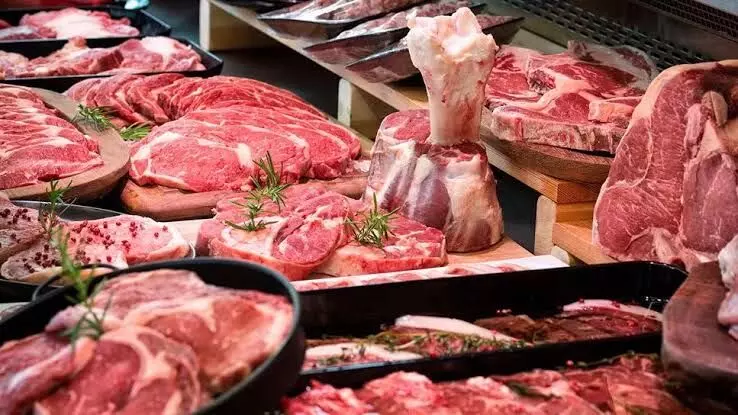With 24 kg per capita, Telangana ranks first in meat consumption in India
There was a myth that Kashmir, being predominantly non-vegetarian, has the highest meat consumption in the country
By Sistla Dakshina Murthy
Representational Image
Hyderabad: Telangana has retained its position as India’s most meat-consuming state, with per capita annual consumption reaching nearly 24 kilograms.
The consumption is three times more than the national average of over 7 kg, according to recent data from the National Sample Survey Office (NSSO) and the National Meat Research Institute (NMRI).
Earlier, there was a myth that Kashmir, being predominantly non-vegetarian, has the highest meat consumption in the country.
The state’s growing appetite for meat, especially in urban centers like Hyderabad, has led to sharp increases in retail prices. Mutton prices in the capital have soared to nearly Rs 1,000 per kilogram, significantly higher than the global average. For comparison, the average price per kilogram stands at Rs 647 in the UK, Rs 624 in Ireland, Rs 494 in Australia, Rs 539 in New Zealand, and Rs 820 in the USA.
At a national workshop held in Hyderabad, NMRI scientists raised concerns about the sustainability of this high demand. Dr. S.B. Barbuddhe, director of NMRI, and Dr. P. Baswa Reddy, principal scientist, warned that the state's meat supply is increasingly dependent on imports of live animals, which currently meet around 50% of Telangana's demand.
“If imports are disrupted, the existing livestock in the state can only sustain the market for about eight months,” said Dr. Reddy. “Such a situation could push prices up by more than 50 percent, severely impacting both consumers and small-scale meat producers.”
Experts also pointed to a critical imbalance in sectoral development. While poultry and broiler farming in the state have modernized rapidly, the goat and sheep sectors remain underdeveloped, making them vulnerable to both demand surges and external market pressures.
Adding to domestic challenges, Dr. Reddy highlighted the risks associated with the Indian government’s recent removal of import duties on Australian meat. He described it as a potential threat to local small ruminant farmers, calling for urgent policy measures to strengthen indigenous production systems.
According to the Ministry of Animal Husbandry’s Annual Report 2023–24, the national average meat availability stands at 7.1 kg per person per year, or roughly 0.6 kg per month, compared to Telangana’s 23.97 kg per year, or 2 kg per month.
With demand continuing to rise and supply chains increasingly stretched, experts say Telangana must act swiftly to modernize its meat production infrastructure and safeguard local producers, or risk a long-term crisis in both affordability and availability.